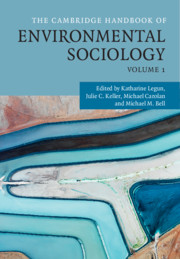Book contents
- The Cambridge Handbook of Environmental Sociology Volume 1
- The Cambridge Handbook of Environmental Sociology
- Copyright page
- Contents
- Figures
- Tables
- Contributors
- Foreword
- Introduction
- Part I Theory in Environmental Sociology
- Part II The Economy and Environmental Sociology
- Part III Culture and Environmental Sociology
- Part IV Politics, Power, State
- Part V Social Justice
- 24 Expanding Critical and Radical Approaches to Environmental Justice
- 25 Development Strategies and Environmental Inequalities in Brazil
- 26 Rural Estrangement: Roadblocks and Roundabouts to Justice
- 27 Environmental Justice and Capitalism
- 28 Ecological Economics and Environmental Sociology: A Social Power Structures Approach to Environmental Justice in Economic Systems
- Index
- References
24 - Expanding Critical and Radical Approaches to Environmental Justice
from Part V - Social Justice
Published online by Cambridge University Press: 05 November 2020
- The Cambridge Handbook of Environmental Sociology Volume 1
- The Cambridge Handbook of Environmental Sociology
- Copyright page
- Contents
- Figures
- Tables
- Contributors
- Foreword
- Introduction
- Part I Theory in Environmental Sociology
- Part II The Economy and Environmental Sociology
- Part III Culture and Environmental Sociology
- Part IV Politics, Power, State
- Part V Social Justice
- 24 Expanding Critical and Radical Approaches to Environmental Justice
- 25 Development Strategies and Environmental Inequalities in Brazil
- 26 Rural Estrangement: Roadblocks and Roundabouts to Justice
- 27 Environmental Justice and Capitalism
- 28 Ecological Economics and Environmental Sociology: A Social Power Structures Approach to Environmental Justice in Economic Systems
- Index
- References
Summary
While the field of environmental justice studies has produced robust theoretical and methodological advances and tools for exploring the intersections among ecological harms and social inequalities, there are numerous limitations within that body of literature. Critical environmental justice is a framework proposed to address some of those gaps, and is applied in this chapter to the case of the Israel-Palestinian conflict to illuminate some ways through which scholars can 1) expand the range of social categories considered in EJ studies, 2) employ and pursue a multiscalar analysis of EJ conflicts, 3) interrogate the logic of dominance and hierarchy that pervade much of EJ scholarship and politics, and 4) introduce the idea of indispensability—a form of ethical political ecology—to address narratives and practices of expendability that underlie many EJ conflicts.
- Type
- Chapter
- Information
- The Cambridge Handbook of Environmental Sociology , pp. 399 - 415Publisher: Cambridge University PressPrint publication year: 2020
References
- 1
- Cited by

